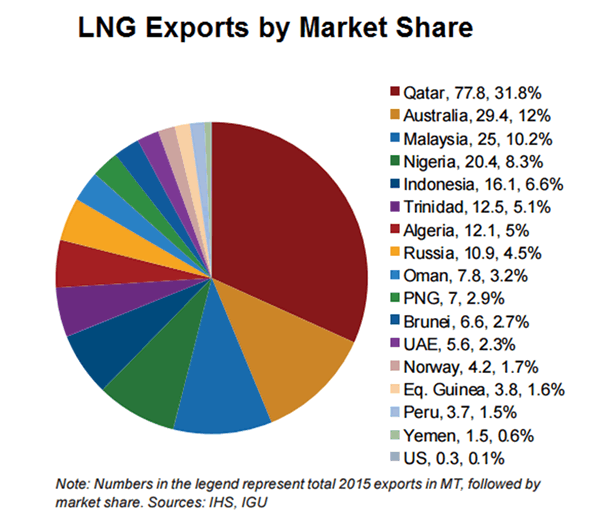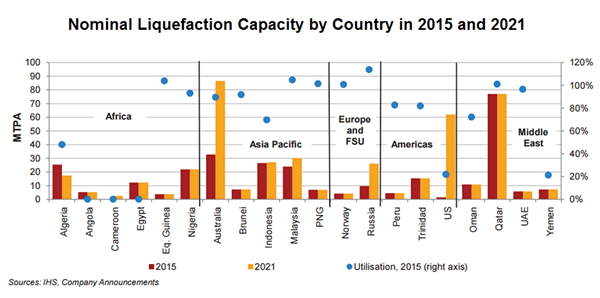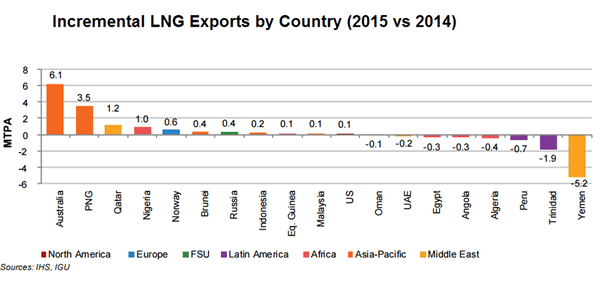Geopolitical uncertainty in the Middle East lifted Australian dollar. A boycott over Qatar is expected to disrupt the country’s exports, benefitting its rival, Australia, over LNG exports. Aussie, however, retreated on ‘Tuesday, using RBA announcement as an excuse. The central bank reiterated that the global economy continued the "broad-based pick-up", suggested that the domestic economic transition from mining investment has "almost complete" and maintained a neutral tone on the monetary policy. Yet, it remained concerned that low household income growth would constrain consumption. We are skeptical over RBA’s forecast that Australia’s economy growth would reach+3% p.a. and cast doubt over how long it can refrain from cutting the policy rate further so as to prevent the property bubble.
Australia and Qatar: Rivals in Natural Gas Exports
Aussie’s rebound accelerated on Monday amidst news that Arab Gulf countries cut diplomatic ties with Qatar and suspended Doha-bound flights. A statement issued by the Saudi government accused Qatar of collaborating with "Iranian-backed terrorist groups" in the eastern region of Qatif and in Bahrain, while Qatar called the accusation "unjustified" and with "no basis in fact".
Australia and Qatar are trading partners. Australia’s exports to Qatar amounted to AU$ 0.55B, and its imports from Qatar amounted to AU$ 0.45B, in 2015-16. Total merchandise trade was approximately at AU$ 1B during that period. Exports are dominated by meat, motor vehicles and live animals. Imports from Qatar are almost entirely fertilisers and LNG products. Yet, these figures were insignificant when compared with the trade relations between Australia and China. Australia’s exports to China amounted to AU$75B, and imports from China amounted to AU$61.5B, in 2015-16. Merchandise trade totaled at AU$ 136.7B during the period.
Indeed, Australia and Qatar are rivals in natural gas exports. Natural gas is Australia’s third largest exports in value terms, after iron ore and concentrates, and coal. It takes up 5.4% of the country’s total exports in 2014. Qatar is the largest exporter of LNG, producing around one-third of the LNG traded. Yet, the rapid ramp-up in LNG investments has raised expectations that Australia would become the world biggest exports by 2020. This hope, was, however, dampened two months ago, as Qatar announced plans to lift the moratorium on further development of its huge North gas field. It was expected that such development could convert to 15.3M tonnes of natural gas per year, in addition to the Middle East country’s existing 77M tonnes annual capacity. The market now expects that the boycott would disruption Qatar’s exports, benefiting Australia.



RBA Struggled to Keep Rates Unchanged.
As widely anticipated, RBA left the cash rate unchanged at 1.5% in June. Policymakers indicated that, "transition to lower levels of mining investment following the mining investment boom is almost complete". Meanwhile, "business conditions have improved and capacity utilization has increased. Business investment has picked up in those parts of the country not directly affected by the decline in mining investment". While acknowledging growth moderation in the first quarter, the central bank maintained the view that GDP growth would "increase gradually over the next couple of years to a little above +3%". On the job market, policymakers acknowledged the payroll growth but remained concerned over the subdued growth in total hours worked as well as wage growth remains. Policymakers warned that persistently low growth in wage would restrain household consumption.
We believe the RBA has been over-optimistic over the economic growth outlook. The huge volatility of commodity prices and concerns over Chinese economy slowdown are the major headwinds to Australian economy. Meanwhile, as the RBA suggested, consumption growth remains challenging on subdued wage growth. Although government spending might provide a boost, the recent budget signals that fiscal stimuli are not under consideration.
We retain the view that RBA is refraining from reducing interest rates so as not to exacerbate the acceleration in housing prices. Policymakers acknowledged that housing prices have been "rising briskly in some markets, although there are some signs that these conditions are starting to ease". They remained concerned that the growth in housing loan has outpaced that of household income. However, the central bank would be forced ease the monetary policy if the economic developments come in worse than what it has anticipated
